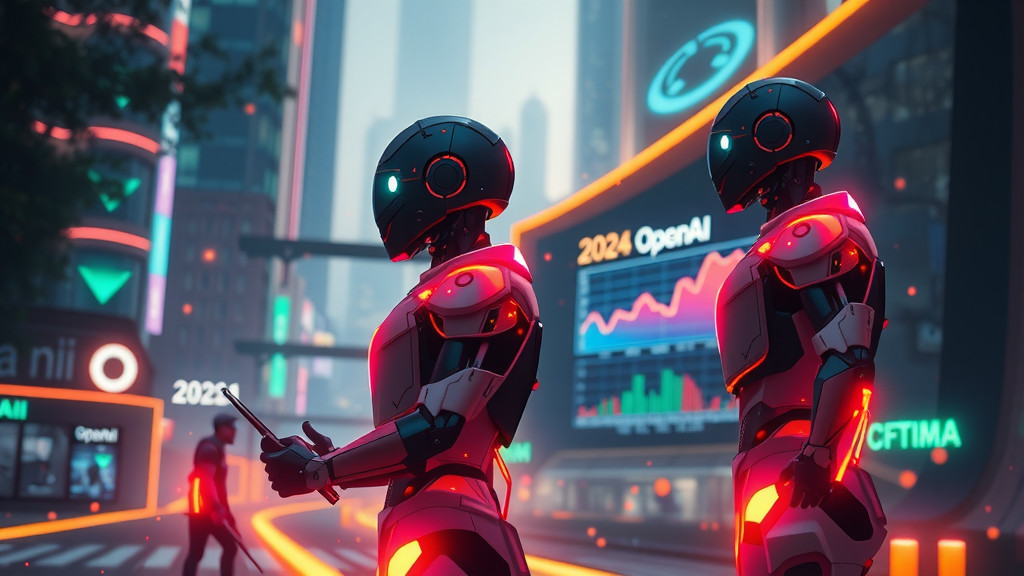As 2024 draws to a close, it's clear that artificial intelligence has not just advanced it has redefined the boundaries of technology, society, and regulation. This year, AI achieved milestones that once seemed like science fiction, while governments and industries scrambled to keep pace with its rapid evolution. From OpenAI's groundbreaking GPT-4o model to the rise of AI regulation and its impact on jobs, here's a comprehensive look at the year that reshaped our relationship with AI.
OpenAI Dominates the AI Landscape
OpenAI remained at the forefront of AI innovation in 2024, despite internal challenges that began the year with a leadership shake-up. The company's GPT-4o model, capable of engaging in eerily human-like audio conversations, sparked both awe and controversy. Critics questioned the ethics of AI systems that mimic human voices, especially when they resembled celebrities like Scarlett Johansson. Meanwhile, OpenAI's push toward Artificial General Intelligence (AGI) raised alarms about the safety and societal implications of creating machines that could rival human intelligence. As OpenAI continues to dominate, the debate over its for-profit model and the safety of its AI systems is far from settled.
AI Reaches Human-Level General Intelligence
In a landmark moment, OpenAI's o3 model achieved human-level performance on the ARC-AGI benchmark, scoring 85% a significant leap from previous AI models. This test measures an AI's ability to generalize from limited examples, a key marker of intelligence. While skeptics question whether this truly brings us closer to AGI, the achievement has undeniably shifted the conversation. AI systems like o3 are now capable of solving complex, novel problems with unprecedented efficiency, hinting at a future where machines could outperform humans in a wide range of tasks.
The Rise of AI Regulation
As AI's capabilities grew, so did concerns about its societal impact. In 2024, governments worldwide took significant steps to regulate AI. California led the charge with laws requiring AI-generated content to be labeled and prohibiting the use of AI-generated likenesses without consent. Colorado passed groundbreaking legislation mandating that AI systems be free from discrimination. At the federal level, the FTC and DOJ cracked down on deceptive AI practices, from fake reviews to algorithmic price-fixing. These efforts mark a turning point in the global effort to rein in A's potential harms while fostering innovation.
AI's Impact on Jobs and Industries
The fear of AI displacing workers became a reality in 2024, as agent AIs began performing tasks traditionally done by humans. A report from the International Monetary Fund estimated that 40% of jobs worldwide could be affected by AI, with low-level office roles at the highest risk. However, some companies, like Alorica, demonstrated how AI can enhance human capabilities by enabling workers to communicate in over 200 languages. The debate over AI's role in the workforce is far from over, with both optimists and pessimists making compelling arguments.
AI Drives Economic Growth and Stock Market Gains
AI wasn't just a technological force in 2024 it was an economic powerhouse. Companies like AppLovin and Palantir saw their stock prices soar as they leveraged AI to drive profits and innovation. AppLovin's AI-powered ad engine, AXON, helped the company achieve a 758% increase in its stock price, while Palantir's data analytics tools saw unprecedented demand. Meanwhile, MicroStrategy's aggressive bitcoin-buying strategy, fueled by AI-driven financial models, turned the company into a crypto heavyweight. These successes underscore AI's growing influence on global markets.
The Infrastructure Behind AI's Boom
Behind every AI breakthrough is a network of data centers, and 2024 saw a surge in their construction. Electricians flocked to Central Washington to build the massive facilities powering AI systems, highlighting the physical infrastructure required to support this digital revolution. These data centers, with their colossal HVAC systems and energy demands, are a testament to the tangible impact of AI on local economies and industries.
Key Takeaways
- AI Achieved Human-Level Intelligence: OpenAI's o3 model reached human-level performance on the ARC-AGI benchmark, signaling a major leap in AI capabilities.
- Regulation Takes Center Stage: Governments worldwide introduced legislation to address AI's societal impact, from labeling AI-generated content to preventing discrimination.
- AI's Economic Impact: AI-driven companies like AppLovin and Palantir saw record stock market gains, while AI's role in the workforce sparked intense debate.
- Infrastructure Boom: The construction of data centers to support AI systems created jobs and highlighted the physical demands of this digital revolution.
- OpenAI's Dominance: Despite internal challenges, OpenAI remained the leader in AI innovation, pushing the boundaries of what machines can do.
As we look ahead to 2025, one thing is clear: AI is no longer a futuristic concept it's a present-day reality reshaping every aspect of our lives.
Sources
- What Happened in AI in 2024, And What Will the New Year Bring?
- An AI Just Reached Human Level On 'General Intelligence'. What That Means
- 2024 Showed It Really Is Possible to Rein in AI
- An A.I. Boom Makes Electricians Flock to Central Washington
- The Top 8 Consumer Electronics Stories of 2024
- AI and crypto drove gains in this year's top 5 tech stocks
